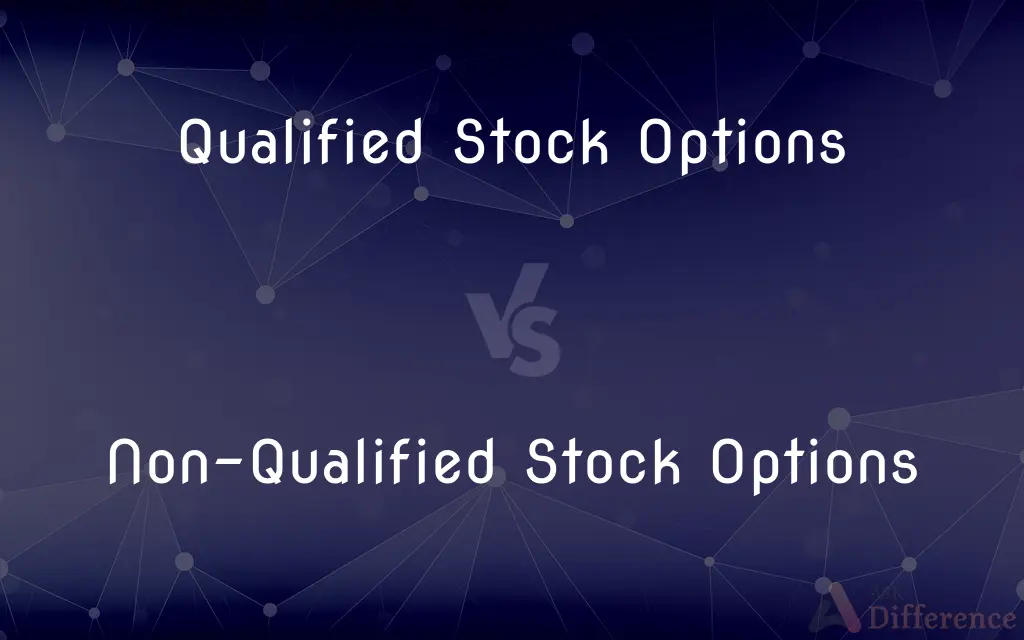Qualified Stock Options vs. Non-Qualified Stock Options — What's the Difference?
By Tayyaba Rehman & Fiza Rafique — Published on February 9, 2024
Qualified Stock Options offer tax benefits and must meet specific IRS criteria, while Non-Qualified Stock Options do not, leading to different tax implications.

Difference Between Qualified Stock Options and Non-Qualified Stock Options
Table of Contents
ADVERTISEMENT
Key Differences
Qualified Stock Options (QSOs), also known as Incentive Stock Options (ISOs), are typically offered to key employees and top management. They offer the potential for tax advantages during the exercise if specific conditions are met, as they adhere to strict Internal Revenue Service (IRS) regulations. On the other hand, Non-Qualified Stock Options (NQSOs) are more flexible and can be granted to employees, consultants, and advisors, but they don't receive the same tax favorable treatment and are subject to ordinary income tax upon exercise.
One of the primary differences between Qualified Stock Options and Non-Qualified Stock Options lies in their tax treatment. QSOs, if held for the required period, allow employees to defer taxes until the shares are sold and the gains are taxed at the long-term capital gains rate. In contrast, NQSOs are taxed at both exercise and sale, with the bargain element at exercise being taxed as ordinary income.
Regarding eligibility, Qualified Stock Options are generally only available to employees of the company and not to consultants or advisors, reflecting their nature as a long-term employee incentive. Non-Qualified Stock Options, however, can be issued to a broader range of people, including non-employees, providing greater flexibility for the company in designing their compensation strategies.
The granting and vesting conditions of QSOs are typically more stringent compared to NQSOs, aligning with the IRS requirements to qualify for preferential tax treatment. For QSOs, there's also a cap on the amount that can be exercised in a year, while no such limit exists for NQSOs, offering a potentially larger immediate financial benefit but with a different tax implication.
Finally, in terms of reporting, companies must adhere to specific requirements for both types of options. However, QSOs require additional adherence to IRS rules to maintain their qualified status, while NQSOs are more straightforward but involve immediate tax implications for the recipient upon exercise.
ADVERTISEMENT
Comparison Chart
Tax Treatment
Favorable tax treatment if certain conditions are met.
Ordinary income tax on exercise.
Eligibility
Primarily for employees.
Employees and non-employees (consultants, advisors).
Exercise Conditions
Must meet IRS criteria for preferential tax treatment.
No specific IRS criteria for exercise.
Vesting
Typically involves strict vesting schedule as per IRS.
More flexible vesting options.
Reporting Requirements
Stringent reporting, adhering to IRS rules.
Less complex but involves immediate tax implications.
Compare with Definitions
Qualified Stock Options
Options that align with IRS guidelines to provide favorable tax treatment.
Her Qualified Stock Options qualified for capital gains tax instead of income tax.
Non-Qualified Stock Options
Employee compensation that's taxable as ordinary income upon exercise.
His Non-Qualified Stock Options were taxed as income when he decided to exercise them.
Qualified Stock Options
Employee stock options that offer tax advantages if held for a specific period.
He exercised his Qualified Stock Options after two years to benefit from lower tax rates.
Non-Qualified Stock Options
Flexible stock options available to employees and non-employees alike.
The consultant was granted Non-Qualified Stock Options as part of his compensation package.
Qualified Stock Options
Incentive stock options designed to retain key employees by offering tax benefits.
The company issued Qualified Stock Options to its executives as a retention strategy.
Non-Qualified Stock Options
Stock options that don't meet IRS criteria for favorable tax treatment.
He had to pay higher taxes on his Non-Qualified Stock Options upon exercising.
Qualified Stock Options
A form of employee compensation that can lead to tax deferral under certain conditions.
By waiting a year, he could convert his Qualified Stock Options to long-term capital gains.
Non-Qualified Stock Options
A type of stock option that provides companies with flexible compensation tools.
The startup used Non-Qualified Stock Options to attract talent without upfront cash compensation.
Qualified Stock Options
Stock options that require adherence to specific IRS rules for preferential treatment.
She consulted a tax advisor to ensure her Qualified Stock Options met the IRS criteria.
Non-Qualified Stock Options
Options that offer immediate financial benefits but come with tax implications.
Exercising her Non-Qualified Stock Options resulted in immediate tax liabilities.
Common Curiosities
Are there any holding period requirements for Qualified Stock Options to receive tax benefits?
Yes, Qualified Stock Options must be held for a certain period to benefit from long-term capital gains tax rates.
What are the immediate tax implications of exercising Non-Qualified Stock Options?
The bargain element of Non-Qualified Stock Options is taxed as ordinary income at the time of exercise.
What is the tax treatment of Qualified Stock Options upon sale of the stock?
If held for the required period, gains from Qualified Stock Options are taxed at long-term capital gains rates.
Do Qualified Stock Options have an exercise limit per year?
Yes, there's an annual limit on the value of shares that can be exercised under Qualified Stock Options to maintain their qualified status.
Can Non-Qualified Stock Options be structured to have flexible vesting schedules?
Yes, Non-Qualified Stock Options often have more flexible vesting options compared to Qualified Stock Options.
Can a company offer both Qualified Stock Options and Non-Qualified Stock Options?
Yes, companies can offer both, often using them strategically for different groups or purposes.
What happens if the holding period for Qualified Stock Options is not met?
The favorable tax treatment is lost, and the options are taxed similarly to Non-Qualified Stock Options.
Are Non-Qualified Stock Options subject to any specific vesting conditions?
Vesting conditions for Non-Qualified Stock Options are set by the company and can be quite flexible.
What differentiates Qualified Stock Options from Non-Qualified Stock Options?
The main difference is their tax treatment and eligibility criteria, with Qualified Stock Options offering potential tax advantages if specific IRS conditions are met.
Can Non-Qualified Stock Options be granted to consultants or advisors?
Yes, Non-Qualified Stock Options can be granted to both employees and non-employees like consultants or advisors.
Are there specific IRS rules that Qualified Stock Options must adhere to?
Yes, Qualified Stock Options must meet certain IRS guidelines to qualify for preferential tax treatment.
How does the exercise of Non-Qualified Stock Options impact an individual's taxes?
Exercising Non-Qualified Stock Options typically increases taxable income for that year due to the bargain element being taxed as ordinary income.
Can Non-Qualified Stock Options be used as a short-term incentive?
Yes, due to their flexibility and immediate tax implications, they are often used for short-term incentives.
How does the exercise of Qualified Stock Options affect an employee's AMT (Alternative Minimum Tax)?
The exercise of Incentive Stock Options (a type of QSO) can trigger AMT, requiring careful tax planning.
What are the reporting requirements for companies issuing Qualified Stock Options?
Companies must adhere to stringent IRS reporting requirements for issuing Qualified Stock Options.
Share Your Discovery

Previous Comparison
Automotive Engineering vs. Automobile Engineering
Next Comparison
White Eggplant vs. Purple EggplantAuthor Spotlight
Written by
Tayyaba RehmanTayyaba Rehman is a distinguished writer, currently serving as a primary contributor to askdifference.com. As a researcher in semantics and etymology, Tayyaba's passion for the complexity of languages and their distinctions has found a perfect home on the platform. Tayyaba delves into the intricacies of language, distinguishing between commonly confused words and phrases, thereby providing clarity for readers worldwide.
Co-written by
Fiza RafiqueFiza Rafique is a skilled content writer at AskDifference.com, where she meticulously refines and enhances written pieces. Drawing from her vast editorial expertise, Fiza ensures clarity, accuracy, and precision in every article. Passionate about language, she continually seeks to elevate the quality of content for readers worldwide.













































